Thank you for the mention, Dr. Jayne — we appreciate the callout, the kind words and learning more about the…
Monday Morning Update 12/7/15
Top News
Kaiser Permanente will acquire Group Health Cooperative, a Seattle-based provider and insurer with 600,000 members and annual revenues of $3.5 billion. Kaiser will pay $1.8 billion upfront and says it will spend another $1 billion over the next several years in creating its Washington Region. The 70-year-old Group Health offers innovative member technologies, but has struggled with budget cuts and layoffs for several years.
Reader Comments
From Billy Gladstone: “Re: HIMSS. You pulled their self description from their latest press release. What happened to it being a “mission-driven not-for-profit?” This announcement contained more ambitious wording that aggressively pitches its data services. The latest Form 990 I could find for HIMSS was for FY2013, in which it reported a loss of $2.6 million on revenue of $82 million, of which $30 million came from the annual conference, $16 million from publishing and conferences, and $10 million from membership dues. It paid some big salaries for an organization of that size, many multiples of what a tiny hospital with $82 million in revenue would pay its executives.
HIMSS paid consultant Jack Beaudoin, formerly of HIMSS Media: $567,000. It also paid $1.4 million to Armin Scheuer Consulting, which I assume is related to its 2011 acquisition of his former company, Berlin-based So2say Communications. It reported $250,000 in lobbying expenses. HIMSS finished its acquisition of MedTech Publishing in 2013 and made it a disregarded entity to protect its own tax-exempt status, with the renamed HIMSS Media bringing in $14.4 million.
From Not From Me: “Re: Charles Sorenson, CEO of Intermountain Healthcare. Will step down as CEO effective fall 2016.” Unverified.
From RegularReader: “Re: Daughters of Charity in California. Gets AG approval to sell itself to a for-profit company.” A hedge fund will be allowed to invest in the struggling non-profit health system with the option to buy it outright after three years in the largest non-profit hospital transaction in California history. The hedge fund names its management company Integrity Healthcare without apparent intentional irony (although the “charity” part of the name would be equally ironic under its involvement). Looking on the bright side, yet another example of unapologetic, bare-knuckles profit-seeking on the backs of sick people just might — as in the case of Martin Shkreli’s Turing Pharmaceuticals — force the country to realize what a mess it made of its healthcare system starting in the mid-1960s and where that’s left us 50 years later.

From Sunquester: “Re: new Sunquest offices. I’m really looking forward to the new office. During the dark days of being private equity owned, little was done for employees.” I agree – other than an extended commute for some employees, it’s nice to get a fresh workspace with a view. Google Earth shows the new building in the foothills of some 8,000-foot Tucson mountains near many plush resorts and restaurants, which should upgrade the lunch options quite a bit. I’ve inhabited everything from a windowless hospital basement to a private office with a beautiful lake view, and while you quickly lose awareness of your surroundings through familiarity, it does indeed give you a sense of your value to your employer and their priorities. My one non-hospital job was working for a vendor whose ever-deepening financial distress was caused by ever-deepening management incompetence. Maintenance to our beat-up old office building was always being deferred until future good times that never came. Our salvage yard-quality cubicles were constantly being reconfigured to support the latest executive emissions that dribbled down from their top-floor, mahogany-walled bunker. The director of my area decided that we would all become energized by staying after work on our own time (it was mandatory) to paint the interior walls of our floor, complete with the jaunty stripes that he envisioned as being reflective of our newfound swagger and inevitable success. The company provided the paint and a terrible fried chicken dinner that — not surprisingly given our executive track record of cluelessness and questionable allocation of resources — was ordered in insufficient quantity to feed the people who gave up hours of their free time to perform menial labor, suffer through faux camaraderie, and elbow each other aside in a vulture-like attempt to snag a chunk of poultry carcass before it ran out (which was probably an apt metaphor for what it was like working there – those in the back of the line who found the chicken bowls empty heatedly accused those who preceded them of taking extra pieces). One week later, the company conducted its next round of layoffs and reorganizations, leading one of the managers who was fired and forcibly marched out of the building to declare bitterly afterward, “The worst part is that I wish I hadn’t painted those damned walls.”
HIStalk Announcements and Requests
Ninety percent of poll respondents will get their medical insurance through their job or via family coverage, with just five percent buying it directly from insurance companies or Healthcare.gov. Mak says he had to postpone retirement for a year because individual health insurance is now so expensive, adding, “Like all massive government programs, the cost is astronomical when compared to the number of individuals benefitting.” Lgro’s employer doesn’t offer a group plan, so he’s paying $14,000 for family insurance whose coverage doesn’t kick in until he has spent $8,000, doubling what he paid in his previous job that offered insurance. Jeff says Obamacare isn’t perfect but at least he can get family insurance from Healthcare.gov until a better option becomes available.
New poll to your right or here: what role does your job play in your existence? Vote and then click the poll’s Comments link to explain since I’m really interested in how people view their work as part of their overall lives.
Speaking of work and life, a friend who has barely survived repeated, horrific bouts of cancer was telling me that she plans to keep working at her health IT vendor employer because she’s worried that the large company can’t replace her even though her remaining lifetime will probably be short. That’s the saddest thing I’ve heard lately — expressing unconditional employer devotion under the misguided belief that such fealty is mutual and not recognizing that “irreplaceable employee” is an oxymoron regardless of your org chart altitude. You might be surprised at how quickly you are forgotten and how little difference your absence makes if strategies change, money gets tight, or you run afoul of someone who outranks you. I’ve never mistaken a paid job for a loving, supportive relationship and I hope others don’t – life is too short to place your entire identity and sense of well-being in the hands of a company (for-profit or otherwise) that is by definition incapable of returning the favor. Tombstones don’t contain job titles and hearses don’t pull U-Hauls full of meaningless company awards and unspent retirement funds. I recall the answer Ivo Nelson gave me in a 2009 interview when I asked him why he was starting another company (Encore Health Resources) when he was already immeasurably wealthy from selling Healthlink to IBM:
This is nothing more than me doing what I love to do. If it leaves a legacy, I think that’s OK, but I’m not sure what you really get out of that. When I’m hopefully up in my 80s or 90s and I pass away, the people that are going to come to my funeral are going to be my family. It’s not going to be clients. It’s going to be people that are close to me personally in my personal life, my kids and my sisters and a handful of friends probably that I have. That’s a legacy. You say, "What kind of legacy would I want to leave?" and it would be a legacy that’s more related to being a good father to my children and being a good husband to my wife. That kind of stuff. Not anything I do professionally.

I’m thinking about hiring someone part time to critically review journal articles related to health IT. Ideally it would be an informatics grad student with a clinical background, access to an online medical library, and the ability to critique research methods and conclusions for a general audience. Email me.
HIStalkapalooza

People are already emailing me about the February 29 event. Here’s what is happening.
- “I want to come” signups will start very soon for HIStalk sponsors, then for everyone in early January.
- We won’t be able to accept new event sponsors after next week because we need to move our focus to planning.
- I am still looking for a single “rock star CEO” sponsor who wants a significant HIStalkapalooza presence and involvement with private space, bar, and food to entertain 100 people or so.

Have you ever dreamed of playing your music on a big music hall stage in front of a bunch of cheering people screaming “Free Bird?” We’re exploring the idea of starting HIStalkapalooza early with music provided by volunteer health IT people who also have a significant musical history. Send Lorre a link to your video or audio and tell me what you would play on stage if chosen. You’ll have to bring any instruments you need unless we can work something out with HOB or the band. I remember years ago at HIMSS when the opening session started with a really good band that turned out to be Dave Garets, Jonathan Teich, and some other industry folks who had at one time paid the bills as musicians.
One last item: HISsies nominations are open. Nominate your choices and I’ll put the most-nominated ones on the final ballot that will be emailed to HIStalk subscribers in a couple of weeks. It’s like the presidential primary: vote now or don’t complain about the choices made by more responsible voters. I’ve added a new item just for fun, “Industry figure you’d most like to see on stage at HIStalkapalooza,” figuring maybe I can get someone famous if they know readers want to see them there.
Last Week’s Most Interesting News
- Welltok acquires Silverlink to expand its patient engagement capabilities.
- Private equity investor and former Vitalize Consulting Solutions Chairman and CEO Bruce Cerullo joins Nordic Consulting as chairman and CEO.
- MIT Hacking Medicine announces that it will publish reviews of digital health tools.
- The Health IT Policy Committee’s API Security Task Force holds its first meeting.
- NantHealth postpones its planned IPO because of unfavorable market conditions.
Webinars
December 9 (Wednesday) 12 noon ET. “Population Health in 2016: Know How to Move Forward.” Sponsored by Athenahealth. Presenter: Michael Maus, VP of enterprise solutions, Athenahealth. ACOs need a population health solution that helps them manage costs, improve outcomes, and elevate the care experience. Athenahealth’s in-house expert will explain why relying on software along isn’t enough, how to tap into data from multiple vendors, and how providers can manage patient populations.
December 9 (Wednesday) 1:00 ET. “The Health Care Payment Evolution: Maximizing Value Through Technology.” Sponsored by Medicity. Presenter: Charles D. Kennedy, MD, chief population health officer, Healthagen. This presentation will provide a brief history of the ACO Pioneer and MSSP programs and will discuss current market trends and drivers and the federal government’s response to them. Learn what’s coming in the next generation of programs such as the Merit-Based Incentive Payment System (MIPS) and the role technology plays in driving the evolution of a new healthcare marketplace.
December 15 (Tuesday) 1:00 ET. “CPSI’s Takeover of Healthland.” Sponsored by HIStalk. Presenters: Frank Poggio, CEO, The Kelzon Group; Vince Ciotti, principal, H.I.S. Professionals. Frank and Vince are back with their brutally honest (and often humorous) opinions about the acquisition. They will review industry precedents (such as Cerner-Siemens), the possible fate of each Healthland product, the available alternatives, and steps Healthland customers should take now. Their previous webinar that covered Cerner’s takeover of Siemens has drawn nearly 7,000 views and this one promises to be equally informative and entertaining.
December 16 (Wednesday) 1:00 ET. “A Sepsis Solution: Reducing Mortality by 50 Percent Using Advanced Decision Support.” Sponsored by Wolters Kluwer Health. Presenters: Rick Corn, VP/CIO, Huntsville Hospital; Stephen Claypool, MD, medical director of innovation lab and VP of clinical development and informatics for clinical software solutions, Wolters Kluwer Health. Sepsis claims 258,000 lives and costs $20 billion annually in the US, but early identification and treatment remains elusive, emphasizing the need for intelligent, prompt, and patient-specific clinical decision support. Huntsville Hospital reduced sepsis mortality by 53 percent and related readmissions by 30 percent using real-time surveillance of EHR data and evidence-based decision support to generate highly sensitive and specific alerts.
December 16 (Wednesday) 1:00 ET. “Need for Integrated Data Enhancement and Analytics – Unifying Management of Healthcare Business Processes.” Sponsored by CitiusTech. Presenters: Jeffrey Springer, VP of product management, CitiusTech; John Gonsalves, VP of healthcare provider market, CitiusTech. Providers are driving consumer-centric care with guided analytic solutions that answer specific questions, but each new tool adds complexity. It’s also important to tap real-time data from sources such as social platforms, mobile apps, and wearables to support delivery of personalized and proactive care. This webinar will discuss key use cases that drive patient outcomes, the need for consolidated analytics to realize value-based care, scenarios to maximize efficiency, and an overview of CitiusTech’s integrated healthcare data enhancement and analytics platform.
Contact Lorre for webinar services. Past webinars are on our HIStalk webinars YouTube channel.
Acquisitions, Funding, Business, and Stock
India-based Indegene Lifesystems announces the acquisition that I mentioned was imminent last week, the SmartCare population health analytics platform from Vantage Point.
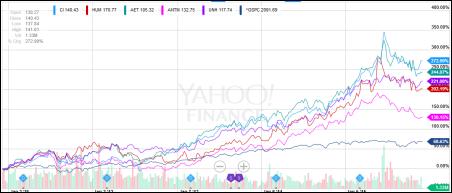
The Economist observes that despite the competition that the Affordable Care Act was supposed to create, America’s five biggest health insurers have seen their share prices triple in the past five years and all are making huge profits that are still trending upward after ACA’s implementation. They’re being helped by the federal government, which is handing off Medicare and Medicaid healthcare to insurance companies. The article concludes, “The vast expense and unintelligible complexity of American healthcare may be a national disgrace, but they are a huge opportunity for firms that can navigate the system and minimize costs.” I graphed the five-year share performance of Cigna (blue, up 273 percent), Humana (red, up 202 percent), Aetna (teal, up 244 percent), Anthem (pink, up 130 percent), and UnitedHealth Group (purple, up 221 percent) vs. the S&P 500 (blue, up 68 percent). Don’t bet against statistical experts.
Lee Equity Partners sells PDR Network to Genstar Capital. PDR Network was formed from Physician’s Desk Reference, Healthcare Notification Network, and LDM Group in moving the print-based publication to a digital business.
People

Premier, Inc. names David Vorhoff (Deloitte Corporate Finance) as SVP of corporate development and strategy.

Ingenious Med names David Lamm (United Allergy Services) as CFO.

Southeastern Health (NC) names consultant Steve Milston as CIO.
Announcements and Implementations
The American College of Cardiology, Geisinger Health System, and xG Health Solutions will develop software based on ACC’s guidelines and Geisinger’s methodology.
Allscripts and TeleTracking will integrate their products and sell each other’s offerings.
Privacy and Security
@CandidCIO found a fascinating security breach buried in the SEC filings of wireless networking vendor Ubiquiti Networks. The company discovered a phishing attack in June 2015 in which $47 million of its money had been transferred to the overseas accounts of scammers. Its ever-vigilant auditors concluded after the fact that, “the Company’s internal control over financial reporting is ineffective due to one or more material weaknesses.”
University of Rochester Medical Center will pay $15,000 to settle HIPAA charges after it gave one of its nurse practitioners a worksheet containing the names, address, and diagnoses of the 3,400 patients she had treated there. She gave the worksheet to Greater Rochester Neurology, at which she had accepted a new job, who mailed the patients letters announcing that the NP was joining them. URMC received patient complaints about the letters and fired the nurse practitioner.
Technology
I use Bitdefender and received an email pitching its Bitdefender Box, a router-attached, smartphone-controlled security appliance that protects every device that’s connected to a home network in what the company calls the “Security of Things.” It costs $199 upfront and then $99 per year for updates, which is a pretty good deal since it theoretically replaces a houseful of individual antivirus and firewall subscriptions. It works on Windows, Apple, and Android devices and also provides a personal VPN service to extend its security to wherever a mobile device is being used. I won’t buy it just yet until they get the bugs worked out, but I think this is the future of malware protection. It might be something hospitals make available to employees or doctors that work offsite or on personal mobile devices since they are often the network’s weak link.
Other
Cerner and several Kansas City groups are sponsoring programming events for 400 female students this week, hoping to change their perceptions of technology careers. Two of the six locations are Cerner campuses. I hadn’t heard of the non-profit Hour of Code, but it’s pretty cool: anyone can organize an event and 150 million students worldwide have participated as the organization strives to improve diversity in computer science.
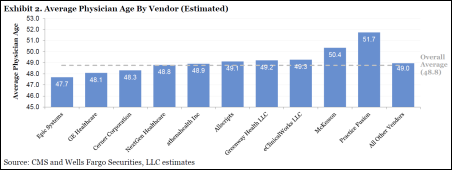
A Wells Fargo Securities report titled “Does Epic Own the Future?” finds that while the average physician EHR user is 49 years old, Epic’s user base is a little bit younger (by a year or so) and Practice Fusion has the highest average age of 51.7. The report theorizes that recent graduates are increasingly going to work for big, Epic-using health systems, while Practice Fusion’s free EHR attracts older doctors who don’t want to spend money or effort on an EHR close to their retirement. I don’t disagree with the theories, but the age spread isn’t enough to get too excited about, I doubt it signals anything important, and it doesn’t distinguish between inpatient and ambulatory use or physicians who are forced to use multiple systems. Slightly interesting is the statement that Epic has more than a 25 percent market share among new graduates vs. all of its competitors that are bunched up at between two and 10 percent.
The EDs of Cleveland’s hospitals will phase out ambulance diversions, which should be interesting presuming they occasionally had valid reasons for not taking new ambulance patients in the first place.

Flooding in the technology hub of Chennai, India causes its premiere, 1,000-bed hospital to lose power and life support systems, killing at least 18 inpatients in a Hurricane Katrina-type situation. Caregivers kept some patients alive by ambu bagging them for up to 48 hours. All communications were down and roads to the hospital were submerged under six feet of water.
This is fun: world traveler and Dell CMO Nick van Terheyden, MD tweets from Dubai that the United Arab Emirates government has blocked Internet access to HIStalk.
A Harvard Business Review article by Frederick Cerise, MD, MPH, CEO of Parkland Health and Hospital Systems (TX) says large, publicly supported safety net health systems like Parkland have an advantage because they are driven by community needs and give clinicians a greater voice in decision-making. He says Parkland has been operating like an ACO since 1989, receives 36 percent of its budget as a county allocation rather than for billing more services, and can resist the financial temptation to offer high-paying but questionably beneficial services. He mentions that the hospital’s tele-dermatology service loses money since half of its patients are uninsured, but it still offers an efficient way to deliver services.
Sponsor Updates
- HealthLoop publishes “5 Things You Need to Know About CMS’s First-Ever Mandatory Bundled Payment Program.”
- TierPoint will host an open house December 10 in Marlborough, MA.
- Visage Imaging debuts several products and enhancements at RSNA 2015.
- VitalHealth Software and Zynx Health will exhibit at the IHI National Forum on Quality in Healthcare December 6-9 in Orlando.
- Voalte releases a new case study, “How Avera McKennan Achieved Efficient Caregiver Communication with Voalte Platform.”
Blog Posts
- Strengthening Primary Care and Population Health Across Accountable Care (Verisk Health)
- A Collaborative Data Model: Separating ‘Marketing Speak’ from MDM Innovation (VisionWare)
- 5 More Reasons Healthcare Providers Can Be Thankful This Year (VitalWare)
Contacts
Mr. H, Lorre, Jennifer, Dr. Jayne, Dr. Gregg, Lt. Dan.
More news: HIStalk Practice, HIStalk Connect.
Get HIStalk updates.
Contact us or send news tips online.



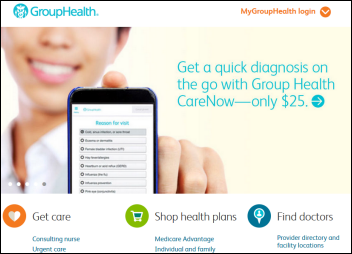


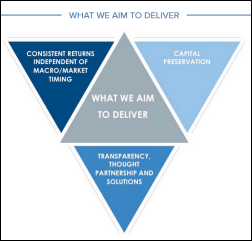

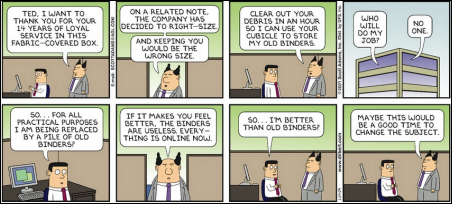




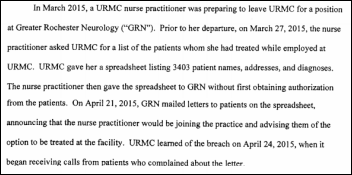


re: HIMSS.
hilarious that none of their proprietary portals are encrypted with SSL.
re: Work and Life and being indispensable:
My dad always used to remind me, whenever I thought I was indispensable…that they change the President of the United States every 4 or 8 years and nothing important seems to change. Don’t you worry, they’ll find someone to replace you, too!
I live in Dubai and read Histalk every day. I never encountered problems of Histalk being blocked.
Re:Group Health and Kaiser. Group Health has been losing membership for years. They are a great offering and the Kaiser rescue is the only way they could survive. Hopefully they will not lose the Seattle culture, but some will fade. The deliver system is a key component for their future and Kaiser is getting a well constructed machine.
On none of the many Dubai networks I’ve used did I notice censorship of your site.
-posted from Dubai
Last time I went to Dubai this site was blocked most of the time at the hotel, and it was unblocked at a couple other places I tried. Probably just inconsistent block lists on different servers.
$teve Lieber, a million dollar man with outrageously overpaid exec staff and consultants runs an aggressively money grabbing organization that loses money. Perhaps he takes the “not for profit” status literally. The little emperor has no clothes but doing well for himself and his cronies.
HISTalk is blocked on both cellular and landline networks if you have du ( on of the 2 internet providers) . The request link to reevaluate blocking the site appears to not get any action as I and others I know have reported the erroneous blocking and it remains blocked.
Mr. H: re your friend who is working because she’s indispensable, been there, seen that, have dried the tears of the naive. I’ve witnessed more layoffs than I can count, with various big companies and vendors and have seen people whose employers previously couldn’t live without kicked to the curb. You can’t be replaced – now, but the same might not be true next quarter. I hope your friend is using her job ONLY as a focus to help beat her cancer. A person should be loyal to his employer, but always remember the relationship is one-way. Your employer values you right up until they day they don’t.
Kaiser has this rep as an org that can do no wrong it seems the past few years but they have gotten their heads handed to them in multiple markets. They lost a nice chunk of change in OH with things getting so bad it forced them to sell in May 2013. Despite the considerable investments in GA, they haven’t had the growth in patient numbers they were projecting. Their growth in the Mid-Atlantic region too hasn’t been anything to right home about either.
It is the CA and CO markets that are the major bread winners for KP. Curious to see how things will go with them taking another long-standing, staff model HMO. Almost bound to create some real friction as you get two-liked minded groups butting heads over who really utilized elements of the same approach in a superior manner.
Re: Bitdefender Box. The price of the Bitdefender Box has been dropped to $99 now an even better deal!